22 Amazing Benefits Of Jujube, How To Use It, & Side Effects
Harness the natural goodness of these Chinese dates in your wellness routine.
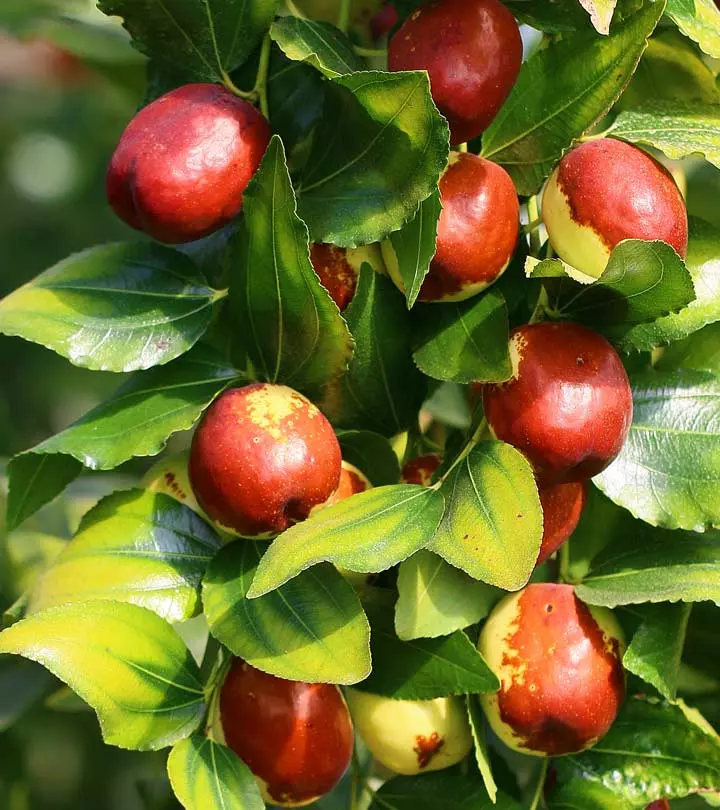
Image: shutterstock
The many benefits of jujube fruit make it a must-have. For centuries, the jujube (Ziziphus jujuba) fruit has been used in Chinese medicine. It contains saponin and is beneficial for reducing anxiety and promoting sleep. Jujube is also known as red dates, Chinese dates, Korean dates, and Indian dates.
Mary Sabat, RD, LD, says, “Jujube is considered a superfood due to its high levels of antioxidants, vitamins, and minerals.” It can relieve congestion caused by gastrointestinal issues. Aside from polysaccharides and flavonoids, it is full of nutrients. Jujube has shown promise in managing neurocognitive disordersi A group of disorders linked with reduced mental function due to a disease other than a psychiatric illness. and cardiovascular disorders.
This article discusses the benefits of jujube fruit, its nutritional profile, how to consume it, and any potential side effects. Take a look.
 Know Your Ingredient: Jujube
Know Your Ingredient: JujubeWhat Is It?
Oval fruit from the buckthorn plant family that turns purplish-brown and wrinkled when mature and tastes like an apple or dates.
What Are Its Benefits?
Its saponin content may help improve sleep and may aid in digestion as it has high fiber content.
Who Can Consume It?
Anyone can consume it except individuals who are taking anti-diabetic drugs and sedatives.
How Often?
It can be consumed daily in moderation.
Caution
Excessive intake may cause drowsiness, diarrhea, constipation, and bloating.
In This Article
What Is Jujube?
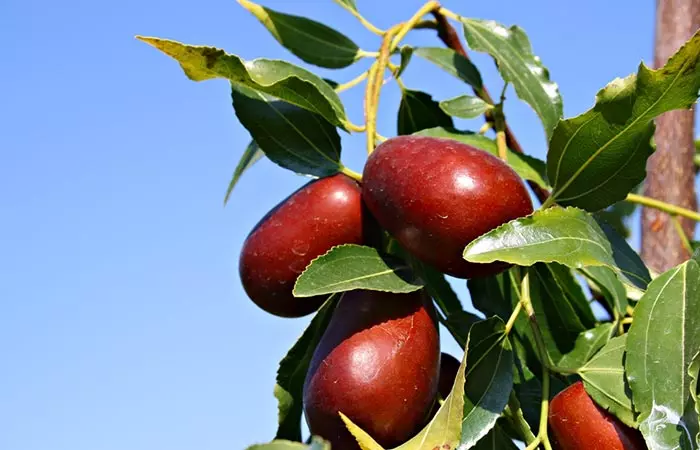
Jujube (Ziziphus jujuba) is a member of the buckthorn family (Rhamnaceae) of plants. It is a small deciduous shrub with shiny green leaves and yellowish-green flowers. The fruit is oval and green when unripe and purplish-brown and wrinkled (like a date) when mature. Though it has the consistency and taste of an apple when ripe, it tastes a lot like dates when mature.
 Trivia
TriviaKey Takeaways
- Jujube contains carbohydrates, vitamin C, potassium, calcium, and protein.
- It may treat cancer and insomnia, improve heart and gastrointestinal health, and enhance bone density.
- It also maintains weight, detoxifies the blood, and protects against brain damage and seizure.
- Store jujube in the refrigerator and consume it within 3-4 days.
- Overconsuming Jujube may cause bloating, nausea, drowsiness, diarrhea, and increased blood sugar.
History Of Jujube Fruit
The earliest mention of jujube can be found in the Classic Of Odes, a Chinese anthology of poems dating back to the 6th century BC. It has also been used medicinally in China and other parts of Asia for at least 2500 years.
Jujube is thought to have originated from Syria and North Africa at least 3000 years ago. It then moved east towards southern Asia and, eventually, to China, where it is still widely grown. It is also found in Madagascar, Bulgaria, some other parts of Europe, and in the islands of the Caribbean.
Though it had over 400 cultivars in China, an inferior range of jujube seedlings was introduced to Europe at the beginning of the Christian era. This eventually found its way to the United States in 1837. It wasn’t until 1908, though, that a better cultivar of jujube from China was brought to the US by the USDA.
Today, the jujube fruit is consumed for its important health benefits. We will explore them in the next section.
What Are The Health Benefits Of Jujube Fruit?
The jujube fruit is rich in calcium, potassium, saponins, flavonoids, betulinic acid, and vitamins A and C. It provides a line of defense from small aches and pains to chronic diseases.
1. May Help Reduce Cancer Risk
Jujube extract is filled with phenolics that boost its antioxidant activity. This means that the antioxidant enzymes found in jujube work more swiftly to get rid of free radicalsi Unstable oxygen-containing molecules that can harm body cells, lead to premature aging, and may trigger chronic diseases. and reduce cancer risk.
There are quite a few in-vitro studies that have proven the ability of jujube extract in preventing the spread of cancer cells. One study done at the University of Calabria showed that it could effectively slow down the spread of, and even kill, malignant breast cancer cells (1).
Another study done in Iran exhibited the ability of jujube extract in inhibiting the spread of cancerous tumor cell lines, especially that of leukemia (2).
2. May Treat Insomnia
, a nutrition consultant, says, “Jujubes have been used as a natural remedy for insomnia due to their calming effect on the body. The fruit is rich in compounds like serotonin and melatonin, which can help regulate sleep patterns and promote relaxation.”
Jujube has been used in traditional Chinese medicine to improve sleep and treat insomnia. The fruit contains saponins that have a sedative and hypnotic effect. Rat studies show that these compounds help induce sleep (3).
Having a cup of warm jujube tea right before you go to bed could give you restful sleep and help in the treatment of insomnia.
3. May Improve Heart Health

Jujubes are loaded with potassium and are low in sodium. Potassium relaxes your blood vessels and helps regulate blood pressure levels (4).
The fruit has also been found to work as an antiatherogenic agent. It prevents fat from getting deposited in and clogging your arteries (5).
Jujube was also found to have helped lower the amount of lipids in the blood of obese adolescents. It could reduce the risk of heart disease in adolescents (6).
4. May Enhance Gastrointestinal Health
Consuming at least 40 milligrams of jujube a day may promote gastrointestinal health. It can improve the overall environment of your gastrointestinal region. The fruit also has important phytochemicalsi Chemical compounds in food that prevent cell damage and eliminate the risk of cancer, heart attack, and other health conditions. that can benefit overall health (7).
In rat studies, jujube fruit extracts were found to have the potential to prevent gastric ulcers (8). Further studies are warranted to understand these effects in humans as well.
5. May Relieve Chronic Constipation
A study conducted by the Meir Medical Center in Israel found that consuming jujube extracts not only relieved the symptoms of chronic constipation but also improved the quality of life (9).
6. May Regulate Circulation
Optimum blood circulation means your organs are thoroughly oxygenated, and you feel generally fresher and full of energy. Consuming a few jujubes a day is a great idea as it is known to nourish blood (10).
The iron and phosphorus in the fruit may have a role to play in this regard. However, more research is warranted.
7. May Boost Immunity
This little fruit is packed with vitamins A and C that are powerful antioxidants. These essential nutrients fight free radical damage that can otherwise compromise the immune system and increase the risk of cancer, heart disease, and rapid aging. These nutrients achieve this by regulating the production of inflammatory cytokinesi Small proteins that play a central role in controlling the growth and activity of other blood and immune system cells. (11).
In studies on rodents, jujube extracts were found to suppress the release of histamine. Histamine is a compound released by cells as a response to inflammatory reactions. The fruit possesses anti-allergic and anti-anaphylactic (preventing hypersensitivity) properties, which also improves respiratory health (12).
8. May Reduce Inflammation
Sabat says, “Studies suggest that jujube may reduce inflammation and relieve joint pain, which could be beneficial for those with arthritis.” The topical use of jujube extract may help relieve a number of muscle aches and joint pains. The seed oils of jujube were found to have anti-inflammatory properties (13).
9. May Reduce Stress And Anxiety
Traditionally, jujube has been used to treat the symptoms of stress, anxiety, and depression. The fruit has a calming effect on the mind and body.
A study done on mice showed that jujube reduced anxiety when taken in lower doses and had a sedative effect when taken in higher doses (14). There are no studies done on humans that provide conclusive evidence for the same. But there is no harm in eating a handful of jujubes when you are feeling particularly stressed.
10. May Improve Bone Strength
Jujube fruit can be beneficial for the elderly or those with brittle bones. It has a high concentration of minerals needed for the formation of bones. This little fruit is filled with calcium and phosphorus that promote bone health (15), (16).
11. May Aid In Digestion
The jujube fruit contains fiber that helps regulate digestion. The nutrient ensures smooth and regular bowel movements. The fruit also has antibacterial properties. It acts against H. pylori, bacteria that are responsible for digestive ailments like peptic ulcersi A gastrointestinal medical condition with open sores inside the upper portion of the small intestine and the stomach lining. and acidity (17).
12. May Help Maintain Weight
Jujube fruits are low in calories and have absolutely no fat. Additionally, they have a high fiber and protein content. Foods rich in protein and fiber are known to increase satiety and potentially help with weight maintenance/weight loss (18). The fruit could fill you up fast and keep you from indulging in unhealthy snacks between meals. Kovalenko says, “Additionally, the antioxidants in jujube can help reduce inflammation and support metabolism, which can help you maintain a healthy weight.”
13. May Help Detoxify Blood
Jujube has anti-inflammatory properties (13). These may help detox blood. However, there is no research to support this. Fighting inflammation could be a way to flush out toxins and boost immunity. But more information is needed in this regard.
14. May Protect Against Brain Damage
The brain cells start degenerating with age. This increases the risk of a number of neurological disorders. Jujube is capable of calming the mind. Studies state that the fruit could be a potential candidate in the treatment of neurological diseases (19).
Jujube also may improve the functioning of astrocytes that are responsible for protecting the neurons (20).
15. May Improve Cognitive Function
Mice studies show that jujube extract may boost memory (21). Jujube extract also boosted nerve cell growth and development in the dentate gyrus area in mice. The dentate gyrus is one of the two areas in the brain where new nerve cells develop (22).
16. May Protect Against Seizures
An experimental study done on seizure-induced mice showed some promising effects of jujube extract on them. The study found that mice that had been treated with jujube extract before being induced with seizures exhibited improved learning and memory and reduced oxidative stress as compared to the control group. Hence, jujube extract may significantly reduce brain damage caused by seizures (23).
17. May Exhibit Antimicrobial Properties
Jujube fruit can help fight infections since it is rich in immune boosting phytochemicals. The flavonoids found in jujube have been proven to be potent antimicrobial agents (24). In fact, the ethanolic extract of this fruit has been found to help in treating infections in children (25).
Also, the betulinic acid found in jujubes has been found to fight HIV and influenza virus infection in experimental studies (26), (27).
18. May Benefit Skin Health

The anti-inflammatory and antioxidant properties of jujube may help in treating acne, blemishes, and scars. However, direct research is lacking in this area.
Jujube has been found to relieve the itchiness caused by eczema (28). It has also shown the potential to inhibit the spread of melanoma (skin cancer) (29).
19. May Increase Hair Growth
The application of jujube essential oil on shaved mice for 21 days resulted in their hair growing back longer and thicker as compared to the control group (30). The oil may possess hair growth-promoting activity. However, more studies are needed to understand the same effects in humans.
20. May Improve Ovarian Health
A study conducted by the Tehran University of Medical Sciences (Iran) used a herbal product of jujube, called Shilanum, to treat ovarian cysts. At the end of the study, they found this natural formula to be just as effective in treating ovarian cysts as birth control pills (they are usually prescribed for this condition). The formula also caused relatively fewer side effects (31). However, more studies with larger sample sizes are recommended.
21. May Help Remove Breast Milk Toxins
In a study conducted in Iran, lactating mothers were made to eat 15 grams of fresh jujubes a day for two months to test its effect on the levels of lead and cadmium in their breast milk. At the end of the trial, they found that the women who had eaten jujubes had lower levels of these toxic elements in their milk as opposed to the control group (32).
22. Boosts Fertility And Fetal Health
In certain Asian cultures, the sweet scent of the jujube fruit is believed to ignite love. The fruit has been used as a symbol of fertility for newlyweds too. Beyond these legends, jujubes also provide benefits for fertility. They are rich in folic acid that may support blood cell generation and fetal development. Additionally, they contain zinc that is crucial for fetal brain development and cognitive function (33). They have key active components, like vitamin C, phenolics, flavonoids, triterpenic acids, and polysaccharides, that provide nutrition. The jujube fruit also has anticancer, antioxidant, anti-obesity, anti-inflammatory, and gastrointestinal-protective protectives that improve overall health (34).
However, it’s important to consume jujubes in moderation during pregnancy, as excessive intake can be harmful. Some pregnant women turn to jujubes for relief from morning sickness and abdominal discomfort, but it’s advisable to consult with a doctor.
Now that we know the various ways Indian jujube benefits your health. In the following section, we will take a look at its nutritional profile.
Nutritional Profile Of Jujube
| Principle | Nutrient Value | Percentage of RDA |
|---|---|---|
| Energy | 22 Kcal | 1% |
| Carbohydrates | 5.66 g | 2% |
| Protein | 034g | 1% |
| Total Fat | 0.06 g | 0% |
| Cholesterol | 0 mg | 0% |
| Dietary Fiber | Nil | Nil |
| Vitamins | ||
| Vitamin A | 11.12 IU | 0% |
| Vitamin C | 19.3 mg | 32% |
| Thiamin | 0.0 mg | 0% |
| Riboflavin | 0.0 mg | 1% |
| Niacin | 0.3mg | 1% |
| Vitamin B-6 | 0.0 mg | 1% |
| Vitamin B-12 | 0.0 mcg | 0% |
| Minerals | ||
| Calcium | 6 mg | 1% |
| Iron | 0.13 mg mg | 1% |
| Magnesium | 3 mg | 1% |
| Phosphorous | 6 mg | 1% |
| Potassium | 70 mg | 2% |
| Sodium | 1 mg | 0% |
| Zinc | 0.01 mg | 0% |
| Other | ||
| Water | 21.80 g | – |
| Ash | 0.1 g | – |
Its rich nutritional profile explains why jujube has a deep-rooted history of medicinal uses. Scroll down to learn more about it.
Traditional Uses of Jujube
Jujube is often utilized in traditional Chinese medicine to strengthen the immune system, nourish the blood, and soothe the mind. It’s thought to reduce stress, promote better sleep, and strengthen intestinal health. Outside of China, jujube has been prized in Indian and Middle Eastern civilizations for its capacity to heal digestive problems, ease sore throats, and enhance overall vitality.
If jujube is a new fruit for you, know that it can be eaten like any other fruit, it can also be included in your diet in other ways.
How To Use Jujube
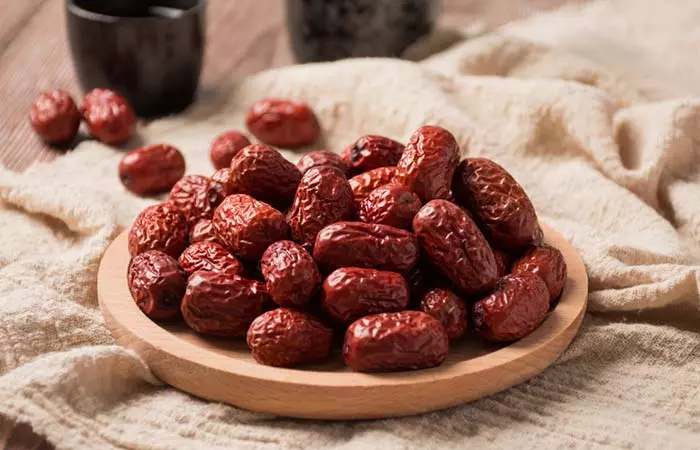
From culinary to medicinal and cultural, there are many ways jujube is used by people around the world. Here’s a rundown of some of its most important uses:
- Fresh and dried jujubes are eaten as a snack all over the world.
- Jujube flavored tea syrup and teabags are widely consumed in China and Korea.
- In some parts of India, jujube is also used to make pickles.
- Croatians use jujube fruit to make marmalades and juices.
- Jujube is majorly used in the Chinese medicine practice of Kampo for its anti-fungal, antibacterial, and anti-inflammatory properties.
- The leaves of the jujube plant are dried and used as potpourri in Bhutan.
- Koreans use the wood of jujube plant to make a wide variety of things like bowls, beads, violin parts, and a double reed instrument called taepyeongso.
- You can also use jujube in smoothies or as a natural sweetener in desserts for added benefits.
Nurul, a blogger, shares his personal experience of eating jujube fruit and sheds light on her extreme fascination for the fruit. He adds, “By far my favourite way to eat them is by squashing them in Bamboo (i).” He further adds, “I remember eating them directly from the trees ripe. Even with worms-we would just bit the part with the wormhole off (and hopefully not discover half a worm… :-)) and gobbled them up!!”
 Trivia
TriviaYou may also try the following jujube recipe.
Jujube Fruit Recipe
Jujube Butter Oatmeal Bars
Ingredients
- 2 cups jujube fruit (chopped)
- 1 cup apple cider
- 1 ½ cups rolled oats
- 1 ½ cups all purpose flour
- 1 cup brown sugar
- 1 teaspoon baking powder
- ½ teaspoon salt
- 1 ½ sticks butter (6 ounces)
- 1 cup pecans (chopped)
- 9×9 pan
Procedure
- Preheat the oven to 350 °F.
- Pour the jujubes and apple cider into a saucepan and heat them until they start boiling. Lower the flame and let the mixture simmer for about 20 minutes.
- Puree the cooked jujubes until you get a smooth paste.
- In a big bowl, combine the oats, flour, sugar, baking powder, and salt and mix them with a wooden spoon.
- Add the butter and stir the mixture until it starts coming together like a dough, without any dry patches.
- Separate half of the dough and keep it aside for later.
- Combine the pecans with the rest of the dough.
- Grease the bottom and sides of your pan with butter.
- Pat the dough you reserved earlier (without the nuts) into the bottom of the pan.
- Spread the jujube butter evenly on top of the dough.
- Add and pat down the rest of the dough (with the nuts).
- Bake for 20-30 minutes until the top has slightly browned.
Let it cool before cutting it into bars or squares.
How To Select And Store Jujube Fruit
Jujube is available from July to November. If you are looking to buy fresh jujubes, make sure you pick ones that are light green and firm. Dried jujubes are usually sold in packets.
Store fresh jujubes on the counter if you mean to consume them within 3-4 days. They will last for a couple of weeks in the fridge. Dried jujubes can be stored and used for several months. However, the fruit may have certain side effects you want to be aware of.
What Are The Side Effects Of Jujube?

As per anecdotal evidence, consuming large amounts of jujubes may cause drowsiness, diarrhea, reduced appetite, constipation, bloating, and malaise in rare cases. Hence, consult your doctor.
Fortunately, jujube does not have any side effects that are a major cause of concern. However, those with diabetes may have to avoid this fruit. Jujube’s carbohydrate content may affect blood sugar levels.
Infographic: Nutrients And Benefits Of Jujube
Jujube or jujuba fruit is a small purplish-brown fruit known for its unique taste. It is also known as Chinese date or red date. If included as part of the diet, this fruit offers an array of health benefits that can be attributed to its beneficial nutrients.
Learn more about the nutrients and benefits of jujube from the infographic below.
Some thing wrong with infographic shortcode. please verify shortcode syntax
Jujube is a fruit native to Africa, that tastes like dates when ripe. Rich in calcium, potassium, flavonoids, and vitamins, the benefits of jujube are significant and many. It not only helps reduce inflammations and improve your cardiac and gastro-intestinal health but may also play a role in cancer prevention and cognitive disorders. Its antioxidant and anti-inflammatory properties help improve your skin and hair health as well. You can consume it as it is or make it into tea, jams, and marmalades to reap its many benefits.
Frequently Asked Questions
How to eat jujube fruit?
You can eat jujube just as you would eat an apple – either by cutting it into slices or whole. Just make sure you remove the seed in the center.
What does jujube taste like?
Fresh jujubes taste like sweet apples, while dry jujubes taste similar to dates. Although jujubes are not dates but their benefits are also similar to many of the benefits of dates. Both fruits are nutritious and provide a good source of energy due to their natural sugars, along with various essential nutrients, and offer a quick energy boost.
What is jujube tea good for?
Jujube tea is good for treating constipation and insomnia and reducing anxiety.
What is jujube extract?
Jujube extract that people usually refer to is the extract taken from the seed of jujube. It is also known as Semen Ziziphi Spinosae.
Is jujube good for pregnant women?
Yes, women can eat jujube when they are pregnant as it is rich in folate and antioxidants. However, they should limit its consumption as may cause constipation when overeaten.
How long does it take for jujube plant to bear fruit?
The plant starts bearing fruits within 12 months.
Can those with diabetes eat jujube fruit?
The research on the effect of jujube on those with diabetes is not conclusive. Since jujube is rich in nutrition and fiber, it may be beneficial for people with diabetes. However, the high sugar content in it could be a reason unsupervised consumption is not encouraged.
Is jujube good for chronic kidney disease?
An animal study indicated that jujube derivatives may improve kidney function and symptoms of anemia (36). However, human studies are warranted to support this claim.
How many jujubes can I eat a day?
You may eat a handful of fresh 5-7 jujubes each day. However, limit your intake of dried jujubes as they are higher in calories and carbohydrates.
Illustration: Amazing Benefits Of Jujube, How To Use It, & Side Effects

Image: Stable Diffusion/StyleCraze Design Team
Learn about jujube fruit’s amazing nutrition facts and health benefits! Dive into this video to discover why this superfood is a must-have in your diet.
Personal Experience: Source
StyleCraze's articles are interwoven with authentic personal narratives that provide depth and resonance to our content. Below are the sources of the personal accounts referenced in this article.
i. One of My Favourite Fruits in the World – the Jujube -‘Boroi’ in Bengali, ‘Puthrea’ in Khmerhttps://nurulsculinaryadventures.wordpress.com/2012/12/08/one-of-my-favourite-fruits-in-the-world-the-jujube-boroi-in-bengali-puthrea-in-khmer/
References
Articles on StyleCraze are backed by verified information from peer-reviewed and academic research papers, reputed organizations, research institutions, and medical associations to ensure accuracy and relevance. Read our editorial policy to learn more.
- Plastina, Pierluigi, et al. “Identification of Bioactive Constituents of Ziziphus Jujube Fruit Extracts Exerting Antiproliferative and Apoptotic Effects in Human Breast Cancer Cells.” Journal of Ethnopharmacology, Elsevier, 24 Jan. 2012.
https://www.sciencedirect.com/science/article/pii/S0378874112000359 - Vahedi, Fatemeh et al. “Evaluation of inhibitory effect and apoptosis induction of Zyzyphus Jujube on tumor cell lines, an in vitro preliminary study.” Cytotechnologyvol. 56,2 (2008): 105-11.
https://www.ncbi.nlm.nih.gov/pmc/articles/PMC2259261/ - Cao, Jie-Xin et al. “Hypnotic effect of jujubosides from Semen Ziziphi Spinosae.” Journal of ethnopharmacologyvol. 130,1 (2010): 163-6.
https://pubmed.ncbi.nlm.nih.gov/20347951/ - Linas, Principal discussant: Sturat L. “The Role of Potassium in the Pathogenesis and Treatment of Hypertension.” Kidney International, Elsevier, 18 Dec. 2015.
https://www.sciencedirect.com/science/article/pii/S0085253815571871 - Hemmati, Mina et al. “Anti-atherogenic potential of jujube, saffron and barberry: anti-diabetic and antioxidant actions.” EXCLI journalvol. 14 908-15. 4 Aug. 2015.
https://www.ncbi.nlm.nih.gov/pmc/articles/PMC4650949/ - Sabzghabaee, Ali Mohammad et al. “Effect of Zizyphus jujuba fruits on dyslipidemia in obese adolescents: a triple-masked randomized controlled clinical trial.” Medical archives (Sarajevo, Bosnia and Herzegovina)vol. 67,3 (2013): 156-9.
https://pubmed.ncbi.nlm.nih.gov/23848030/ - Wojdyło, Aneta, et al. “Phenolic Composition, Ascorbic Acid Content, and Antioxidant Capacity of Spanish Jujube (Ziziphus Jujube Mill.) Fruits.” Food Chemistry, Elsevier, 21 Jan. 2016.
https://www.sciencedirect.com/science/article/pii/S0308814616300905 - Hamedi, Shokouhsadat et al. “Gastroprotective effect of aqueous stem bark extract of Ziziphus jujuba L. against HCl/Ethanol-induced gastric mucosal injury in rats.” Journal of traditional Chinese medicine = Chung i tsa chih ying wen panvol. 35,6 (2015): 666-70.
https://pubmed.ncbi.nlm.nih.gov/26742312/ - Naftali, Timna et al. “Ziziphus jujuba extract for the treatment of chronic idiopathic constipation: a controlled clinical trial.” Digestionvol. 78,4 (2008): 224-8.
https://pubmed.ncbi.nlm.nih.gov/19142004/ - Lam, Candy T.W., et al. “Chemical and Biological Assessment of Jujube (Ziziphus Jujuba)-Containing Herbal Decoctions: Induction of Erythropoietin Expression in Cultures.” Journal of Chromatography B, Elsevier, 25 Sept. 2015.
https://www.sciencedirect.com/science/article/abs/pii/S1570023215301963 - Wintergerst, Eva S et al. “Contribution of selected vitamins and trace elements to immune function.” Annals of nutrition & metabolismvol. 51,4 (2007): 301-23.
https://pubmed.ncbi.nlm.nih.gov/17726308/ - Naik, Suresh R., et al. “Evaluation of Anti-Allergic and Anti-Anaphylactic Activity of Ethanolic Extract of Zizyphus Jujuba Fruits in Rodents.” Revista Brasileira De Farmacognosia, No Longer Published by Elsevier, 6 May 2014.
https://www.sciencedirect.com/science/article/pii/S0102695X13701091 - Al-Reza, Sharif M., et al. “Anti-Inflammatory Activity of Seed Essential Oil from Zizyphus Jujuba.” Food and Chemical Toxicology, Pergamon, 26 Nov. 2009.
https://www.sciencedirect.com/science/article/pii/S0278691509005614 - Peng, W H et al. “Anxiolytic effect of seed of Ziziphus jujuba in mouse models of anxiety.” Journal of ethnopharmacologyvol. 72,3 (2000): 435-41.
https://pubmed.ncbi.nlm.nih.gov/10996283/ - Miklavčič, A. Višnjevec, et al. “An Integrated Characterization of Jujube (Ziziphus jujuba Mill.) Grown in the North Adriatic Region.” Food technology and biotechnology57.1 (2019): 17-28.
https://pubmed.ncbi.nlm.nih.gov/22081690/ - Lee KJ, Kim KS, Kim HN, Seo JA, Song SW. Association between dietary calcium and phosphorus intakes, dietary calcium/phosphorus ratio and bone mass in the Korean population. Nutr J. 2014;13(1):114. Published 2014 Dec 13.
https://www.ncbi.nlm.nih.gov/pmc/articles/PMC4292818/ - Abdoul-Azize S. Potential Benefits of Jujube (Zizyphus LotusL.) Bioactive Compounds for Nutrition and Health. J Nutr Metab. 2016;2016:2867470.
https://www.ncbi.nlm.nih.gov/pmc/articles/PMC5174181/ - Sharafi M, Alamdari N, Wilson M, Leidy HJ, Glynn EL. Effect of a High-Protein, High-Fiber Beverage Preload on Subjective Appetite Ratings and Subsequent Ad Libitum Energy Intake in Overweight Men and Women: A Randomized, Double-Blind Placebo-Controlled, Crossover Study. Curr Dev Nutr. 2018;2(6):nzy022. Published 2018 Jun 23.
https://www.ncbi.nlm.nih.gov/pmc/articles/PMC6016687/ - Chen, Jianping et al. “A Review of Dietary Ziziphus jujubaFruit (Jujube): Developing Health Food Supplements for Brain Protection.” Evidence-based complementary and alternative medicine : eCAMvol. 2017 (2017): 3019568.
https://pubmed.ncbi.nlm.nih.gov/28680447/ - Chen, Jianping et al. “A chemically standardized extract of Ziziphus jujuba fruit (Jujube) stimulates expressions of neurotrophic factors and anti-oxidant enzymes in cultured astrocytes.” Phytotherapy research : PTRvol. 28,11 (2014): 1727-30.
https://pubmed.ncbi.nlm.nih.gov/25066116/ - Zhang, Yanqing et al. “Hplc-ESI-MS/MS analysis of the water-soluble extract from Ziziphi spinosae semen and its ameliorating effect of learning and memory performance in mice.” Pharmacognosy magazinevol. 10,40 (2014): 509-16.
https://pubmed.ncbi.nlm.nih.gov/25422554/ - Hwang, In Koo et al. “Zizyphus enhances cell proliferation and neuroblast differentiation in the subgranular zone of the dentate gyrus in middle-aged mice.” Journal of medicinal foodvol. 14,3 (2011): 195-200.
https://pubmed.ncbi.nlm.nih.gov/21332397/
- Pahuja, Monika et al. “Hydroalcoholic extract of Zizyphus jujuba ameliorates seizures, oxidative stress, and cognitive impairment in experimental models of epilepsy in rats.” Epilepsy & behavior : E&Bvol. 21,4 (2011): 356-63.
https://pubmed.ncbi.nlm.nih.gov/21723789/ - Mehreen, Arifa et al. “Phytochemical, Antimicrobial, and Toxicological Evaluation of Traditional Herbs Used to Treat Sore Throat.” BioMed research internationalvol. 2016 (2016): 8503426.
https://www.ncbi.nlm.nih.gov/pmc/articles/PMC4939213/ - Daneshmand, F et al. “Crude Extract from Ziziphus Jujuba Fruits, a Weapon against Pediatric Infectious Disease.” Iranian journal of pediatric hematology and oncologyvol. 3,1 (2013): 216-21.
https://www.ncbi.nlm.nih.gov/pmc/articles/PMC3915445/ - Zhao, Hua et al. “Ionic derivatives of betulinic acid as novel HIV-1 protease inhibitors.” Journal of enzyme inhibition and medicinal chemistryvol. 27,5 (2012): 715-21.
https://www.ncbi.nlm.nih.gov/pmc/articles/PMC3438379/ - Hong, Eun-Hye et al. “Anti-Influenza Activity of Betulinic Acid from Zizyphus jujuba on Influenza A/PR/8 Virus.” Biomolecules & therapeuticsvol. 23,4 (2015): 345-9.
https://www.ncbi.nlm.nih.gov/pmc/articles/PMC4489829/ - Mansouri, Parvin et al. “Review of Medicinal Remedies on Hand Eczema Based on Iranian Traditional Medicine: A Narrative Review Article.” Iranian journal of public healthvol. 45,8 (2016): 986-996.
https://www.ncbi.nlm.nih.gov/pmc/articles/PMC5139979/ - Hung, Chi-Feng, et al. “Antiproliferation of Melanoma Cells by Polysaccharide Isolated from Zizyphus Jujuba.” Nutrition, Elsevier, 6 Aug. 2011. www.sciencedirect.com/science/article/abs/pii/S0899900711001845
- Yoon, Jung In et al. “Hair growth promoting effect of Zizyphus jujuba essential oil.” Food and chemical toxicology : an international journal published for the British Industrial Biological Research Associationvol. 48,5 (2010): 1350-4.
https://pubmed.ncbi.nlm.nih.gov/20206225/ - “Comparative Study of the Effects of Treatment with Herbal Product Shilanum and High-Dose Contraceptive Pills on Functional Ovarian Cysts.” Comparative Study of the Effects of Treatment with Herbal Product Shilanum and High-Dose Contraceptive Pills on Functional Ovarian Cysts | International Journal of Current Research.
www.journalcra.com/article/comparative-study-effects-treatment-herbal-product-shilanum-and-high-dose-contraceptive - Kelishadi, Roya et al. “A randomized controlled trial on the effects of jujube fruit on the concentrations of some toxic trace elements in human milk.” Journal of research in medical sciences : the official journal of Isfahan University of Medical Sciencesvol. 21 108. 7 Nov. 2016.
https://www.ncbi.nlm.nih.gov/pmc/articles/PMC5322685/ - A review of dietary ziziphus jujuba fruit (jujube): developing health food supplements for brain protection
https://pubmed.ncbi.nlm.nih.gov/28680447/ - The Jujube (Ziziphus Jujuba Mill.) Fruit: A Review of Current Knowledge of Fruit Composition and Health Benefits
https://pubs.acs.org/doi/full/10.1021/jf4007032 - “FoodData Central Search Results.” FoodData Central.
fdc.nal.usda.gov/fdc-app.html#/food-details/168151/nutrients - Shiying Huang, Xue Jiang, Qiugu Chen, Zhaoliu Hu, Fochang Wang, Yuan Zhao, Gui-Zhong Xin, Jianping Chen, Jujube polysaccharides mitigated anemia in rats with chronic kidney disease: Regulation of short chain fatty acids release and erythropoietin production, Journal of Functional Foods, Volume 86, 2025,104673.
https://www.sciencedirect.com/science/article/pii/S1756464621003224#
Read full bio of Alexandra Dusenberry
- Mary Sabat, MS, RDN, LD, is a registered dietitian and a certified in personal training by the American Council of Exercise. She has 30 years of experience in nutrition education, wellness coaching, fitness training, holistic health, and weight loss coaching. She obtained her bachelor's degree in Dietetics and Nutrition from the University of Delaware and master’s degree in Human Nutrition with an emphasis on Exercise Science from Rutgers University.
 Mary Sabat, MS, RDN, LD, is a registered dietitian and a certified in personal training by the American Council of Exercise. She has 30 years of experience in nutrition education, wellness coaching, fitness training, holistic health, and weight loss coaching. She obtained her bachelor's degree in Dietetics and Nutrition from the University of Delaware and master’s degree in Human Nutrition with an emphasis on Exercise Science from Rutgers University.
Mary Sabat, MS, RDN, LD, is a registered dietitian and a certified in personal training by the American Council of Exercise. She has 30 years of experience in nutrition education, wellness coaching, fitness training, holistic health, and weight loss coaching. She obtained her bachelor's degree in Dietetics and Nutrition from the University of Delaware and master’s degree in Human Nutrition with an emphasis on Exercise Science from Rutgers University. - Barbara Kovalenko is a nutritional consultant with 4 years of experience in nutrition and mindful eating coaching. She earned her bachelor's degree in nutrition from Bogomolets National Medical University, Ukraine and master's degree from Boston University, USA.
 Barbara Kovalenko is a nutritional consultant with 4 years of experience in nutrition and mindful eating coaching. She earned her bachelor's degree in nutrition from Bogomolets National Medical University, Ukraine and master's degree from Boston University, USA.
Barbara Kovalenko is a nutritional consultant with 4 years of experience in nutrition and mindful eating coaching. She earned her bachelor's degree in nutrition from Bogomolets National Medical University, Ukraine and master's degree from Boston University, USA.
Read full bio of Ravi Teja Tadimalla
Read full bio of Arshiya Syeda
Read full bio of Aparna Mallampalli







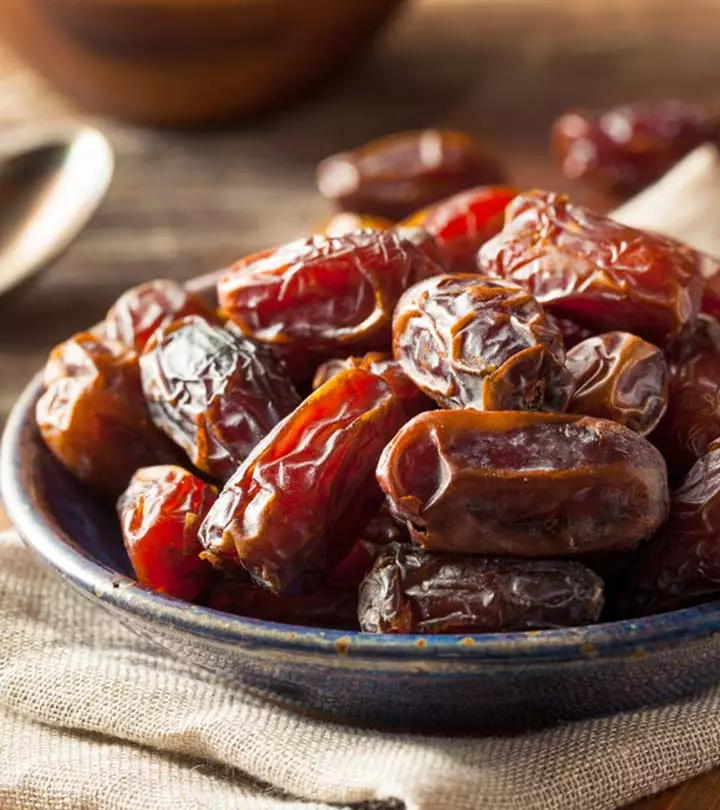
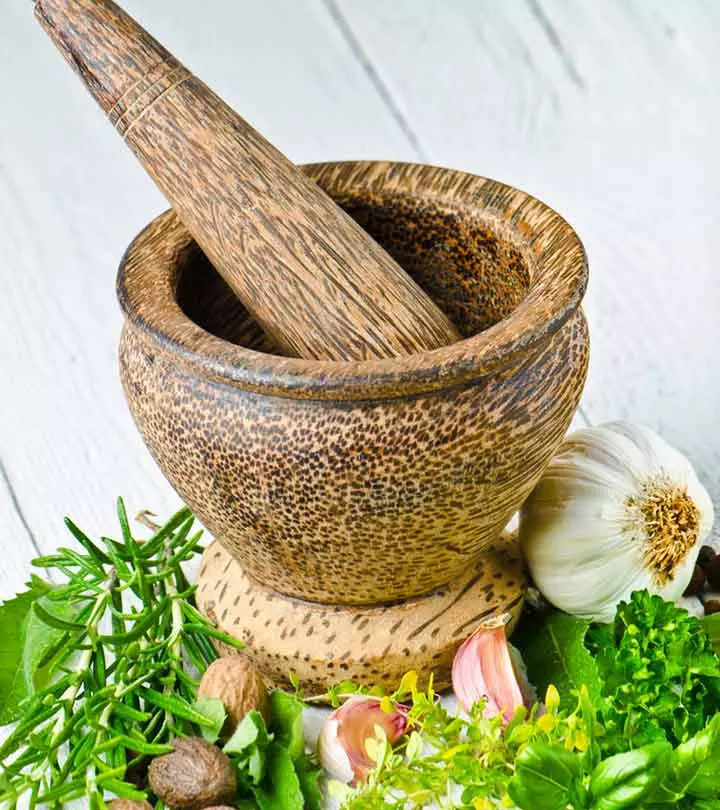
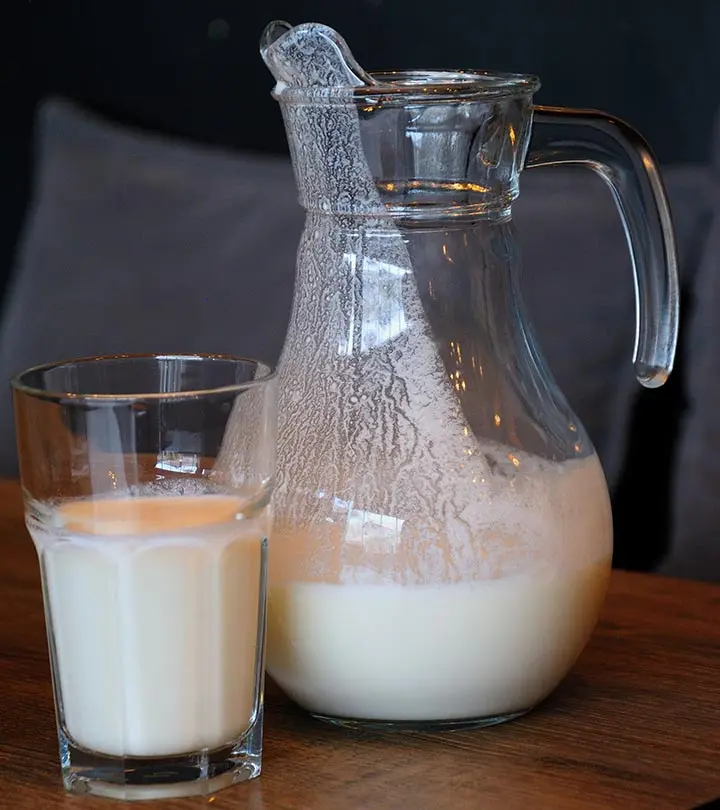

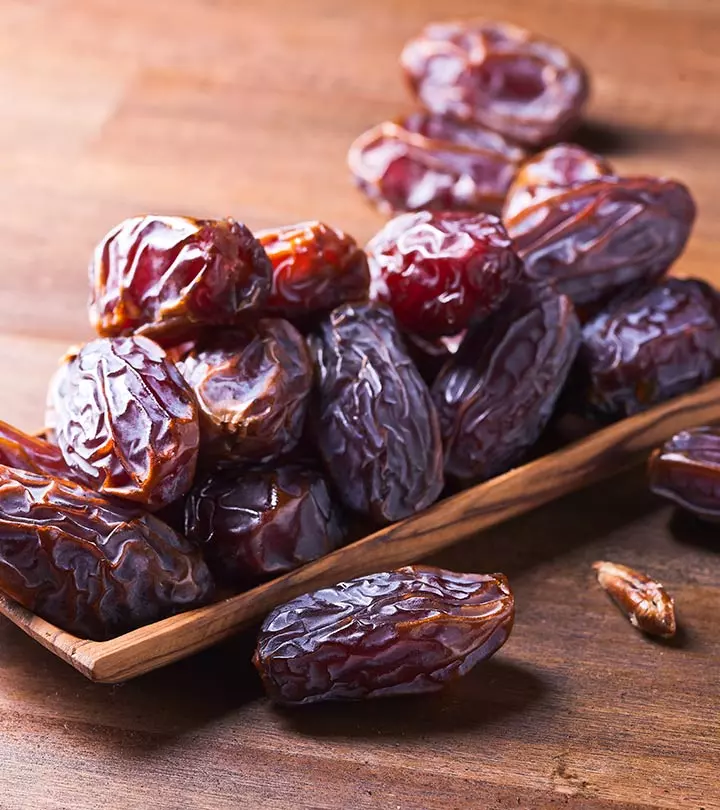
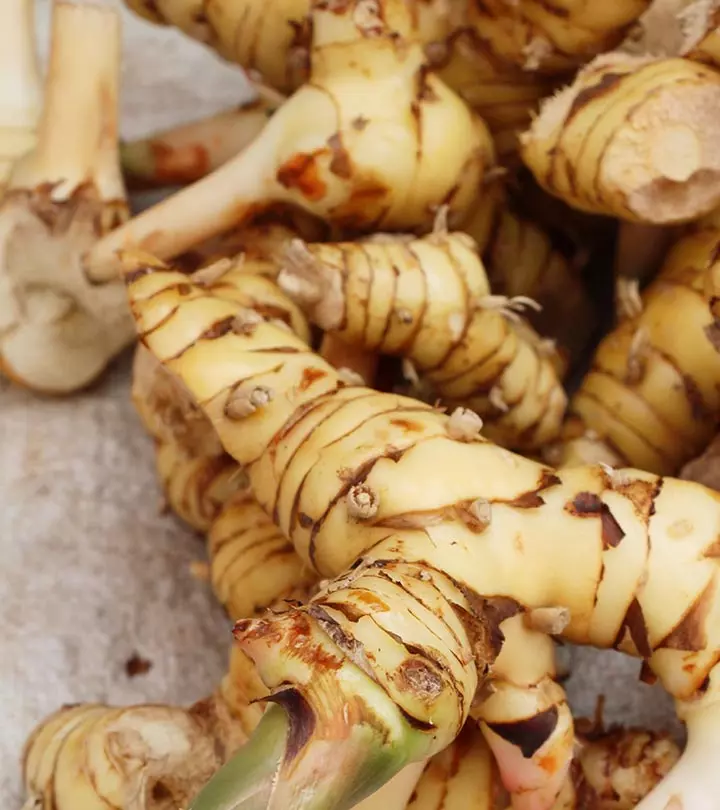

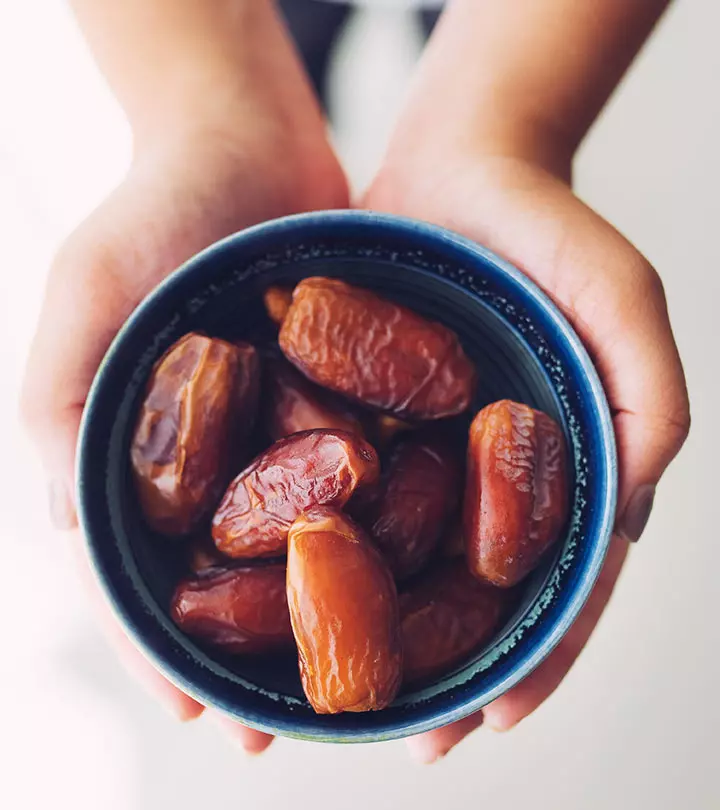
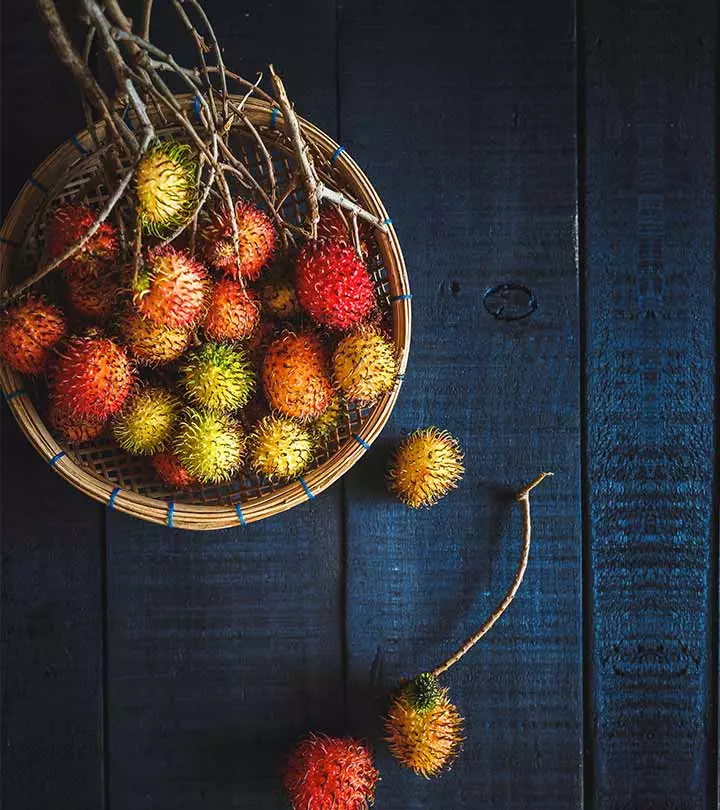

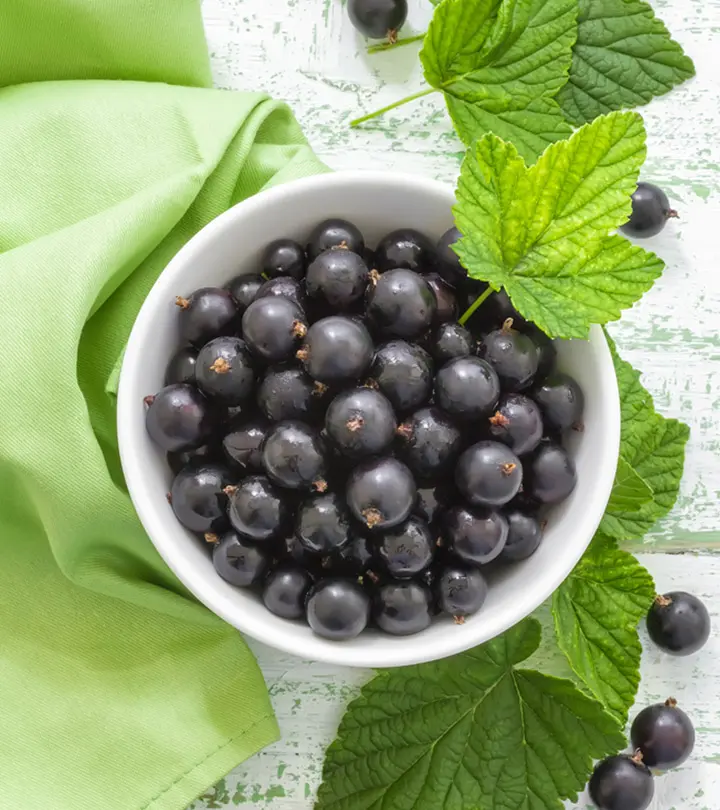

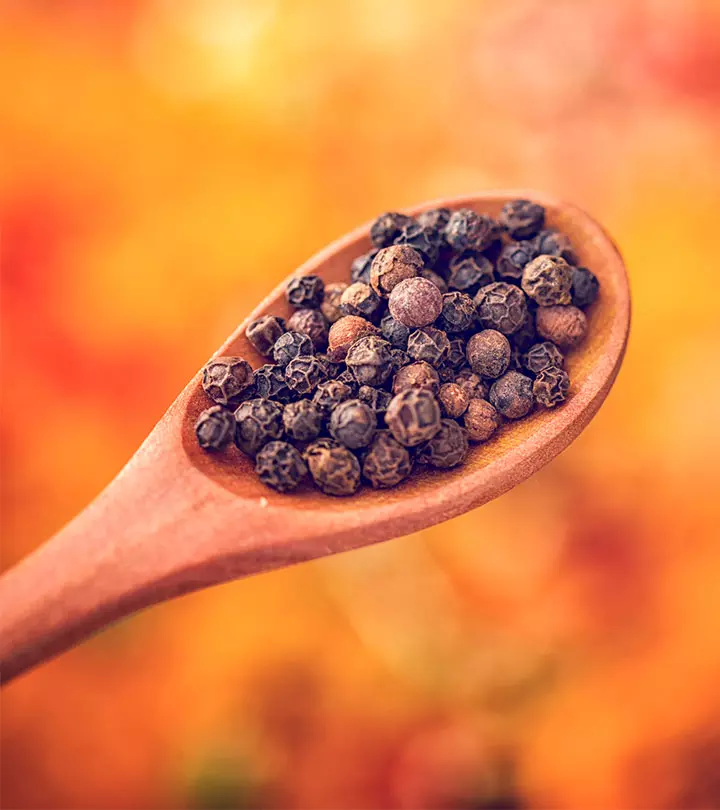
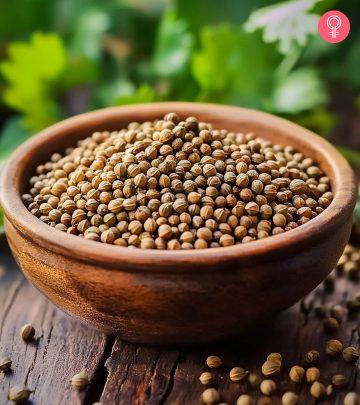
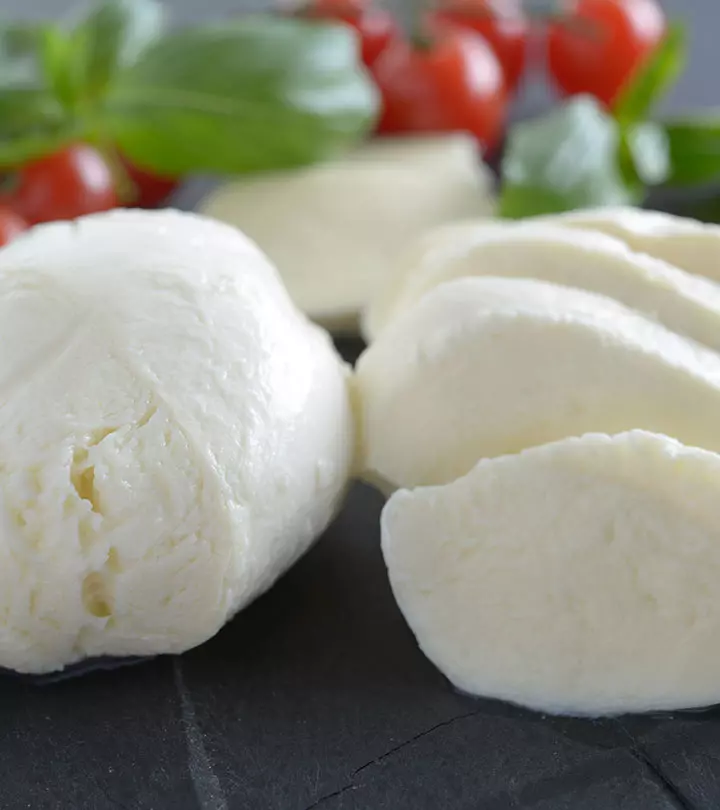
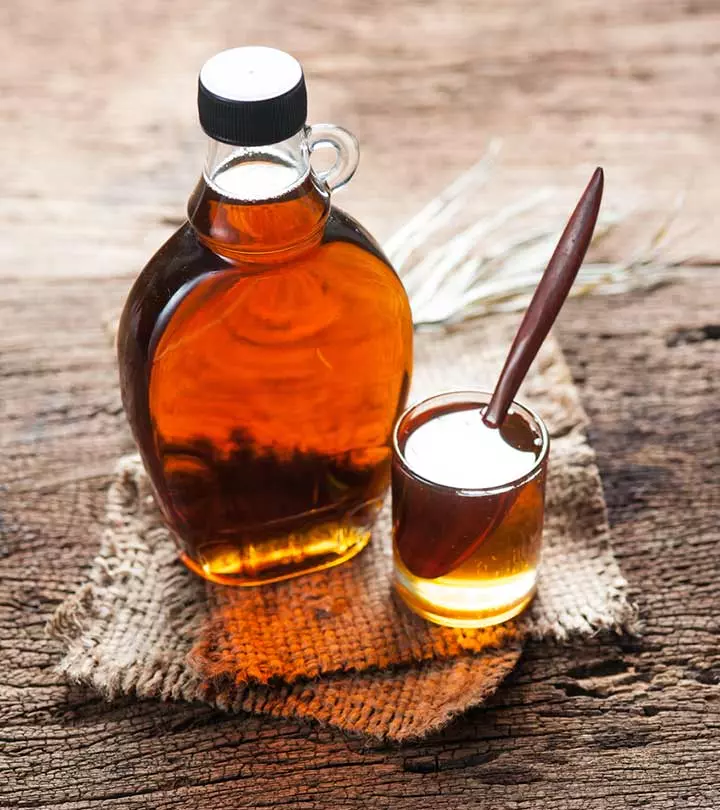
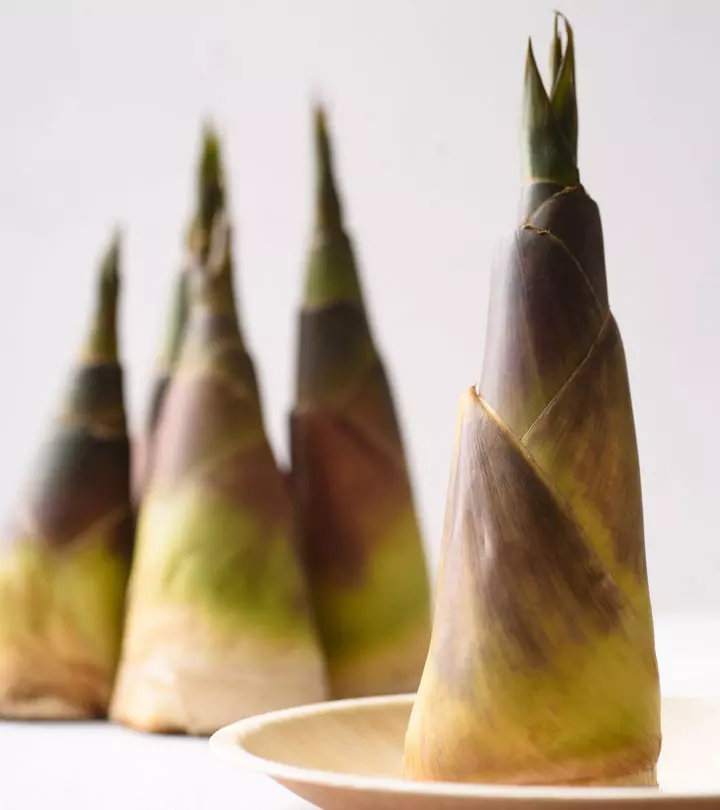

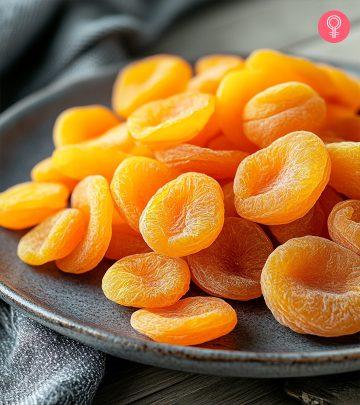
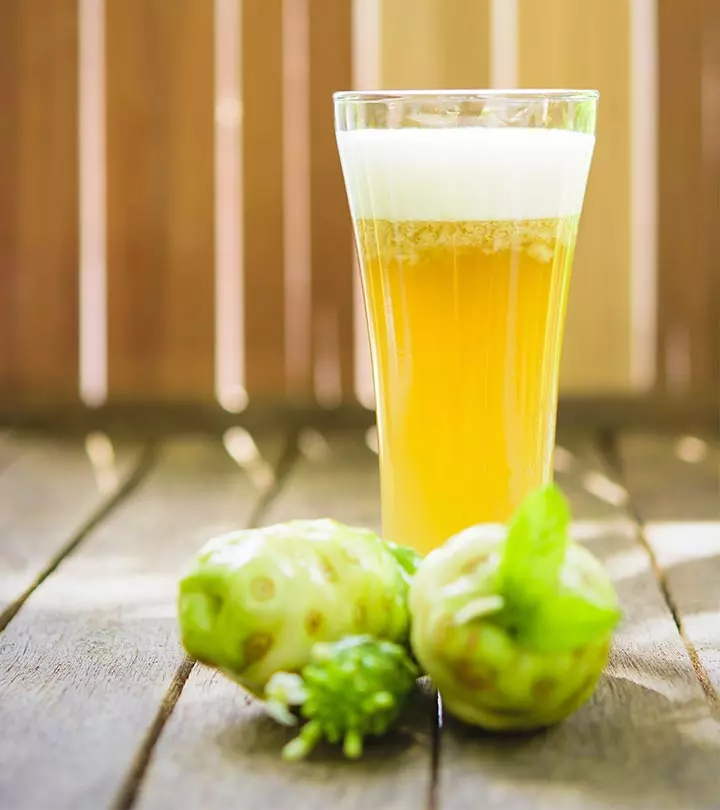
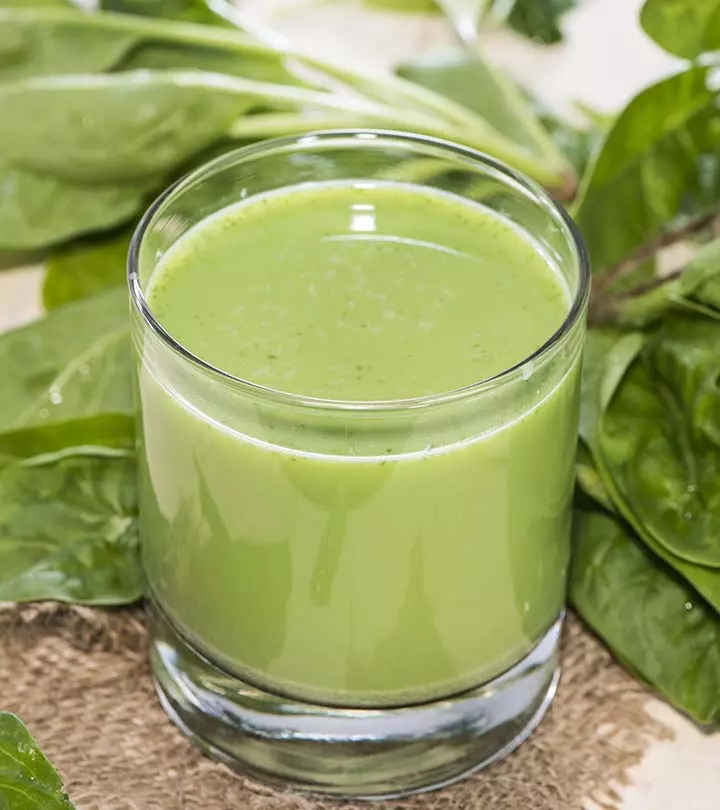
Community Experiences
Join the conversation and become a part of our empowering community! Share your stories, experiences, and insights to connect with other beauty, lifestyle, and health enthusiasts.